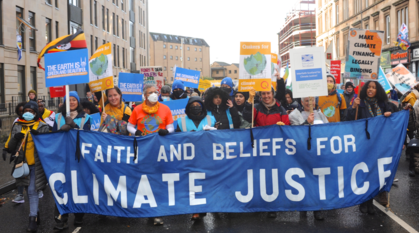Quakers: The Religious Society of Hufflepuffs?
Chloe Scaling takes a light-hearted look at the possible parallels between Quakerism and the world of Harry Potter.

This blog unites two of my great interests: Quakers and Harry Potter. As a member of Generation Z, I grew up with the Harry Potter books and films, wrote about queer Harry Potter fanfiction while at university and I listen to a number of podcasts about the series.
Last year I had the privilege of being in the audience of the live recording of one of these podcasts, Harry Potter and the Sacred Text. It was held in Friends House, Euston, where I now work. Quakers were mentioned a couple of times because of the venue and because the opening section of Harry Potter and the Deathly Hallows includes a quote from Quaker William Penn. It got me thinking about the potential connections between Harry Potter and Quakerism.
Quakers and the Hogwarts houses
Those of us who grew up reading the Harry Potter series often sort ourselves and each other into the houses created by JK Rowling. For those who haven't read the books, students attending Harry's school, Hogwarts, are all sorted into different houses at the beginning of their time there.
These houses largely dictate their social circle and who they share dormitories, common rooms and lessons with. Each house values different things and suits different people: Gryffindor is associated with bravery, for example.
So, which house would Quakers be sorted into?
I would argue that Quakers fit best into Hufflepuff house. As a Hufflepuff myself, this piece is not unbiased.
Hooray for Hufflepuffs
When Helga Hufflepuff founded a Hogwarts house, she went against the other founders, who looked for specialist skills in their pupils, by creating a space where all are welcome. Similarly, when Quakerism emerged, it was on the basis that all human beings could experience a direct connection with the divine.
Nineteenth century Quaker Anna Maria Fox, who co-founded a polytechnic school in Falmouth (the first use of the term 'polytechnic', meaning 'of many arts and techniques', in Britain), would no doubt admire Hufflepuff's determination to teach all wizards and witches.
Unlike with other houses, to be a Hufflepuff you don't have to be a pureblood wizard, you don't have to be able to answer riddles and you don't have to have great ambition. To be a Quaker, you don't have to say or believe in a set creed, be from a particular background or social class or know a lot about theology and religion.
If Hufflepuffs do have specific traits, they are seen as kind-hearted and loyal. It's my hope that Quakers in Britain and around the world strive to be both kind-hearted and loyal, seeking truth and justice.
Harry Potter Wiki also cites patience and dedication as traits of Hufflepuffs. Patience can be seen as necessary for Quakers: in meeting for worship, we sit and wait in expectation. Quaker decision-making processes are often slow and can be frustrating for the impatient soul. Activists need dedication to carry on striving for what they believe in. However, I believe that the core of Hufflepuff House is radical inclusion: the same should be true of Quakerism.
Going for Gryffindor
It has been suggested that early Quaker George Fox could be seen as more of a Gryffindor due to his rebellious streak and habit of standing up to authorities at a time when Quakerism was illegal and Quakers were seen as trouble-makers.
This seems quite accurate and could ring true of Quaker activists making a stand for their faith today, with some getting arrested for nonviolent direct action. However, I see the Hogwarts house system as linked to members' motivations rather than to their actions.
If it were only about actions, then Neville Longbottom, one of Harry's friends who is often seen as a scaredy-cat, would probably not have been sorted into Gryffindor. In a similar way, George Fox's motivations may lie more in Hufflepuff than Gryffindor, as his actions didn't come from a place of seeking glory or fame for his bravery (though we can never know his true intentions).
Quaker characters
We could also look at Quaker and the Harry Potter series in the opposite way. For example, when Harry Potter and the Sacred Text was recorded at Friends House, co-host Casper ter Kuile suggested Harry himself could be a Quaker!
On reflection, this could be true: he often uses the spell 'expelliarmus' in duels, aiming to disarm his opponents rather than injure or kill them. This nonviolence reminds me of the Friends Ambulance Unit. It was a civilian volunteer ambulance service set up by a group of Quakers during World War I to offer much needed medical support.
Hermione Granger is another character who could be a closet Quaker. Like Quakers sometimes are, Hermione is motivated into action when she sees an injustice few others are campaigning on and decides to do something.
However her work to free Hogwarts' house elves from their life of servitude has been widely criticised as an example of 'white saviour complex'. Rather than working with the house elves to aid their liberation, she thinks she knows best and gets on with the work without consulting them.
Many charities and other organisations in the real world can be seen as doing things for marginalised people rather than with them, but change is happening.
In a Quaker context I know of ways that we are changing how we understand allyship and walking alongside people in the struggles that they face. We've been exploring power and privilege (PDF), centring refugees in Quaker sanctuary work, and trans and non-binary Friends are central to Young Friends General Meeting's work on trans and non-binary inclusion.
What else?
I've only scratched the surface of the parallels between Quakerism and the Harry Potter books. Part of the joy of the books is that they reward close reading and can be interpreted in all sorts of creative ways limited only by our imaginations.
Do get in touch with us on social media to let us know your thoughts!


